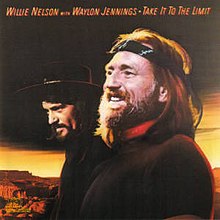Take It to the Limit (Willie Nelson album)
| Take It to the Limit | |||||
|---|---|---|---|---|---|
 |
|||||
| Studio album by Willie Nelson with Waylon Jennings | |||||
| Released | April 1983 | ||||
| Genre | Country, outlaw country | ||||
| Length | 33:44 | ||||
| Label | Columbia | ||||
| Producer | Chips Moman | ||||
| Waylon Jennings chronology | |||||
|
|||||
| Willie Nelson chronology | |||||
|
|||||
| Professional ratings | |
|---|---|
| Review scores | |
| Source | Rating |
| Allmusic |
|
Take It to the Limit is an album by Willie Nelson with Waylon Jennings, released in 1983 on Columbia Records.
Take It to the Limit was the third Jennings/Nelson duet album and the second to be produced by Chips Moman. Whereas their previous album together, 1982's WWII, had contained more Waylon solo tracks, this LP includes five tracks sung solely by Willie. The title actually reads Wille Nelson with Waylon Jennings, likely the result of the LP being released on Nelson's label CBS (the previous two duet albums had been released on RCA). The title song was written by Eagles' members Randy Meisner, Don Henley and Glenn Frey and performed by the Eagles on their 1975 album, One of These Nights, while "Homeward Bound" was originally by Simon and Garfunkel. Take It to the Limit was the next-to-last collaboration between Jennings and Nelson; of the four duets albums released by the singers, 1978's Waylon & Willie achieved the greatest success. Despite the fact that neither singer was in top artistic form and Jennings' most successful days were already over, the record managed to chart, peaking at #3, as did WWII. "Why Do I Have to Choose" also reached #3, while the title track reached #8 on the singles chart.
In his review of the album for AllMusic, James Chrispell writes, "it sounds like these two hombres are just plain tired and saddle-sore from all the high riding days of the past. Most of the tunes are covers of previous hits by other artists and have little in association with what Willie (or Waylon) are about except for their take on George Jones' "Why Baby Why." By this time, fans were beginning to say the same thing." Author Joe Nick Paroski stated in his 2008 book Willie Nelson that the LP "reflected a growing distance. The effort sounded half-hearted, as if they were recording together only because it made good business, and it clocked in at a mere thirty-four minutes."
...
Wikipedia
